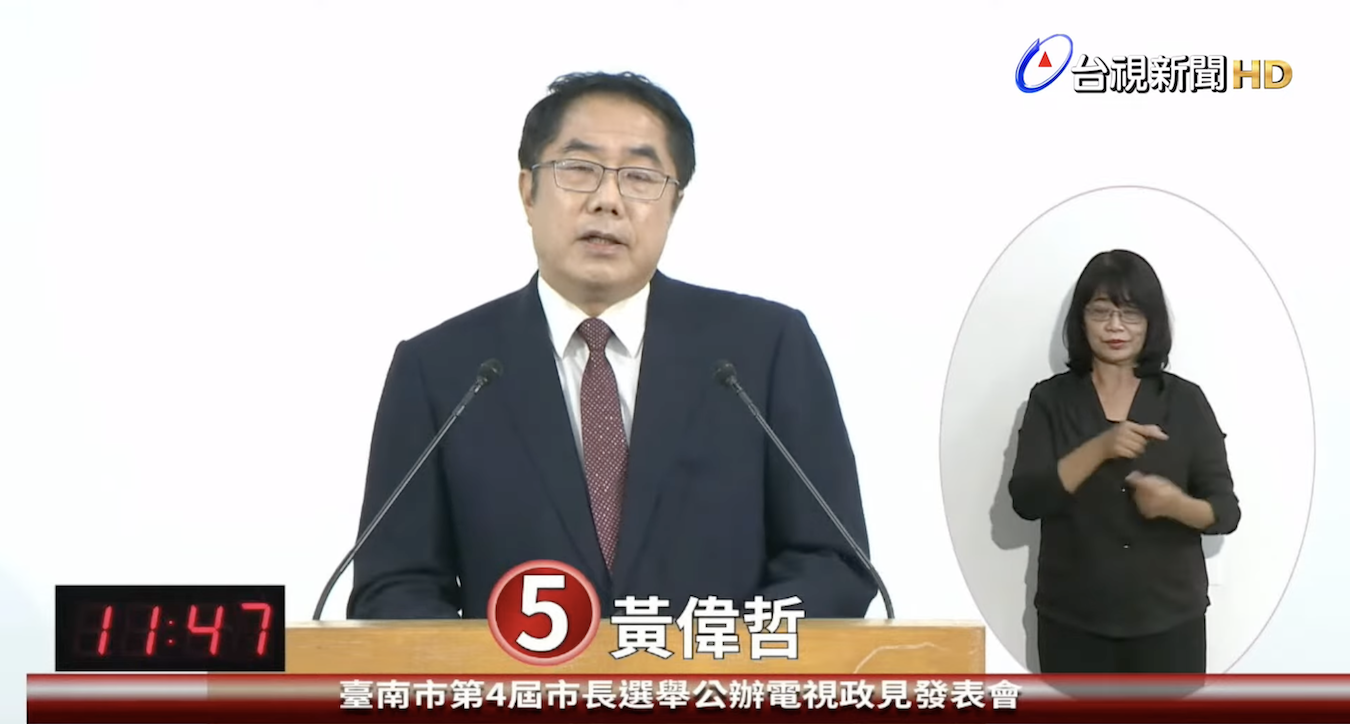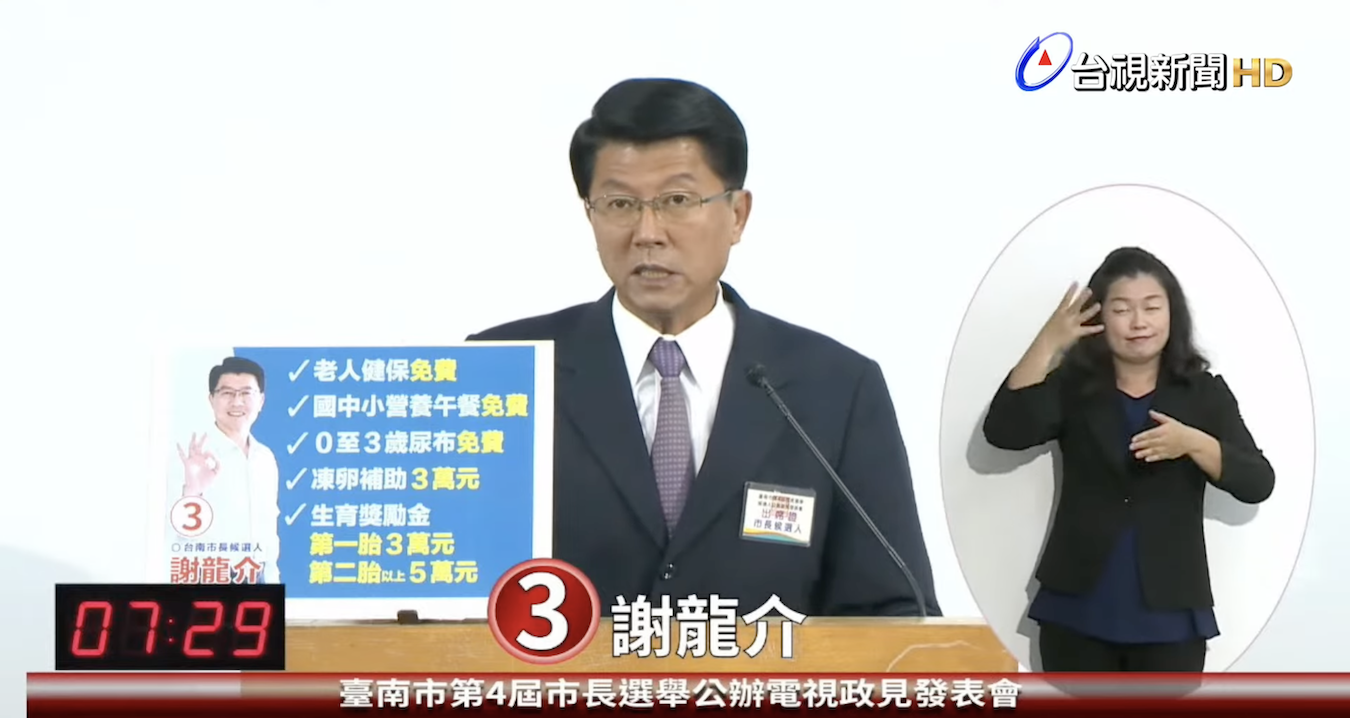by Brian Hioe
語言:
English
Photo Credit: TTV/YouTube
THE TAINAN MAYORAL policy presentation was held on November 16th. This piece will focus on the two primary contenders, Hsieh Lung-chieh of the KMT, and incumbent Huang Wei-che of the DPP. The policy presentation took place in the form of each candidate being given twenty minutes to make a presentation. The presentation took place almost entirely in Taiwanese Hokkien, though Huang broke into Mandarin at some points.
Hsieh began by attacking Huang for what he claimed was a deterioration of public safety in Tainan. This was reflected in a recent incident involving a gunman firing a submachine gun into the campaign office of independent city councilor Hsieh Tsai-wang. Hsieh likewise suggested improper ties between Huang and other political figures. Hsieh called on Tainan residents to make a clean break from Huang and the DPP’s historic control of Tainan, long a stronghold of the pan-Green camp.
 Incumbent Huang Wei-che of the DPP. Photo credit: TTV/YouTube
Incumbent Huang Wei-che of the DPP. Photo credit: TTV/YouTube
When it came to policy, Hsieh made a number of policy proposals, generally aimed at providing assistance for the elderly and alleviating the burden on young parents. Hsieh stated that he would make insurance free for the elderly and provide free lunches for elementary and middle school children. Diapers would be provided free for infants between 0 and 3, a one-time stipend of 30,000 NT would be provided to parents for their first child, and 50,000 NT per child for any child afterward. Hsieh was heavily emphatic on Tainan’s declining birthrate and population as an issue, citing statistics regarding this, and suggesting that this was a fault of the DPP.
Huang Wei-che was next to speak. Huang criticized Hsieh for politicizing what he framed as a random incident of violent crime and blaming it on him, while also touting the city’s response to the shooting incident as quick and effective. Huang stressed his support for police and firefighters, including increasing fees paid to police.
Huang cited that Tainan had been through a great deal during COVID-19, but praised Tainan citizens for their spirit of solidarity. In particular, Huang touted the DPP’s record in the fight against COVID-19, managing to avoid Tainan being heavily hit by the coronavirus, in terms of the number of cases and medium to severe cases. This included with regards to the successful vaccination of Tainan, the city government’s use of technology in efforts to fight COVID-19, and the establishment of medical facilities specializing in COVID-19 cases. Moreover, Huang asserted that his administration had created employment opportunities and attracted investment to Tainan.
Furthermore, Huang emphasized efforts to stabilize the power supply for Tainan, including using renewable sources of energy such as solar power. Huang stated that because of issues in poverty in Tainan, his government had taken efforts to provide young parents, the disprivileged, and others with aid, particularly involving housing for young people, while care facilities for the elderly had also been set up. Huang stated that efforts to boost social welfare in Tainan were aimed at providing genuine assistance, rather than for elections. To this extent, Huang stated that his administration was focused on women’s rights.
 Hsieh Lung-chieh of the KMT. Photo credit: TTV/YouTube
Hsieh Lung-chieh of the KMT. Photo credit: TTV/YouTube
It is generally expected that Huang will win the election, with there being little chance for a KMT challenger to achieve victory in Tainan. Nevertheless, the KMT has sought to make inroads into southern Taiwan and other traditional territories of the pan-Green camp since Kaohsiung mayor Han Kuo-yu’s unset 2018 victory. This has not been successful but can be seen as a parallel to how the DPP has sought to hang onto traditional pan-Blue territories that it wrested from the KMT in previous elections, such as Taoyuan. After Han’s 2018 victory, the DPP has placed greater effort into campaigning in southern Taiwan, so that southern constituencies do not come to view the DPP as taking their support for granted.
At the same time, the KMT has sometimes sought to field candidates in Tainan as a way of positioning them for future office elsewhere, in the knowledge that they will not win. More generally, the KMT may be seeking to play the long game in southern constituencies. The KMT likely hopes to leverage on the economic disparities between southern and northern Taiwan–as in the phenomenon of young people leaving for the north in search of better opportunities–in order to try and build a base in southern Taiwan.

